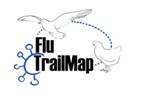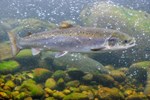Dr Sarah Hill
Department: Pathobiology & Population Sciences
Research Groups: Pathogen Flow in Ecosystems, IRLFS (Research Programme)
Research Centres: Veterinary Epidemiology, Economics and Public Health
Sarah holds a position as Lecturer in Genomics and Infectious Disease (Research Track) at the RVC. She studies the epidemiology and evolution of viruses in natural populations, including zoonotic viruses.
Sarah graduated with a BA in Biological Anthropology (Archaeology and Anthropology Tripos) from the University of Cambridge in 2012. She obtained a DPhil from the University of Oxford, funded by the Wellcome Trust through the Genomic Medicine and Statistics Doctoral Training Centre. Her DPhil was titled ‘Genomic approaches to virus discovery and molecular epidemiology’. The Linnean Society awarded Sarah the 2019 John C Marsden Medal for the best UK doctoral thesis in biology.
After her DPhil, Sarah completed two postdoctoral positions at the University of Oxford with Prof Oliver Pybus and Prof Nuno Faria. She joined the RVC as an independent research fellow in 2020. She previously held a Sir Henry Wellcome Postdoctoral Research Fellowship (Sept 2020 - Sept 2024). In 2024 Sarah was appointed to a Lectureship in Genomics and Infectious Disease, which protects most of her time for research.
Sarah is currently supported by grant funding from BBSRC (2022 - 2025, Academy of Medical Sciences Springboard award (2021 - 2025), and Wellcome Trust, and from the Genomics for Animal and Plant Disease Consortium (GAP-DC2). Sarah's team currently includes one postdoctoral researcher, Dr Mingli Zhao, and two PhD students, Mr Lorcan Carnegie and Ms Ciara Judge.
Sarah is a Research Associate of the University of Oxford’s Department of Biology. Sarah is a member of the BBSRC Pool of Experts (2023 - 2026).
Sarah’s research focuses on investigating the epidemiology and ecology of zoonotic and animal viruses. Zoonotic virus outbreaks are intensifying worldwide because of climate change, land-use change and population growth. We know strikingly little about how most zoonotic viruses transmit amongst non-human reservoir species. Better understanding how viruses spread amongst animals will improve our ability to predict and control outbreaks of zoonotic and animal viruses.
Sarah’s work combines wet-laboratory data generation with phylodynamic analyses of virus genomes. She uses viral genomic sequence data to reconstruct viral outbreak dynamics and spatiotemporal dissemination. Sarah collaborates with colleagues at national veterinary and public health agencies in the UK and abroad, and has helped advise the World Health Organization on virus genomic sequencing and analysis.
Please see https://orcid.org/0000-0002-2995-2596 or https://scholar.google.co.uk/citations?user=kNtlfaEAAAAJ&hl=en for a full list of publications.
Please contact Sarah if you are interesting in applying with her for funds to work or study with her at the RVC.
Sarah has been involved in several policy focused activites, including most recently:
- Member of the WOAH/FAO Network of Expertise on Animal Influenza (OFFLU) Applied Epidemiology Expert Group.
- Invited Expert, WHO consultation on pathogen genomic data sharing platforms.
- Invited Expert, FAO Global Consultation on Highly Pathogenic Avian Influenza (3 days, Rome, 2023). Meeting outputs include:
- FAO. 2023. Global consultation on highly pathogenic avian influenza (HPAI) – Rome, Italy, 2–4 May 2023. FAO Animal Production and Health Reports, No. 20. Rome. doi:10.4060/cc7302en.
- Steering committee member of One Health policy workshop organised between the African Academy of Sciences and Academy of Medical Sciences, Kenya (3 days, Nairobi, 2023). Meeting outputs include:
- AMS and AAS. 2024. Workshop report: Research to strengthen One Health approaches in Africa: Working together towards a better life.
- Technical Advisor for WHO (2020). Outputs include:
- World Health Organization. 2021. Genomic sequencing of SARS-CoV-2: A guide to implementation for maximum impact on public health. ISBN 978-92-4-001845-7.
- World Health Organization. 2021. Interim guidance: SARS-CoV-2 genomic sequencing for public health goals.
- World Health Organization. 2020. Interim guidance: Diagnostic testing for SARS-CoV-2.
-
FluTrailMap (Poultry) consortium
The project brings together leading researchers at top UK scientific organisations to better understand and mitigate the threats of bird flu viruses to the poultry sector.
-
Genomic epidemiological determination of routes of pathogenic virus transmission between farmed salmon
Viruses in farmed salmon harm the UK's economy, decrease industry sustainability, and reduce fish welfare. Piscine myocarditis virus (PMCV) and infectious salmon anaemia virus (ISAV) are particularly damaging. This project aims to improve understanding of how these viruses spread between farms, and hence inform actions that can improve disease control and reduce disease incidence.
-
UK Research and Innovation (UKRI) Global Challenges Research Fund (GCRF) One Health Poultry Hub
With integrated streams of social, economic, biological, mathematical and policy-led research, we are co-producing detailed knowledge on the biological, structural and socio-economic factors that shape networks of chicken production and distribution. The RVC-led UKRI GCRF One Health Poultry Hub brings together leading laboratory, clinical, veterinary and social scientists, as well as skilled communications experts, programme support staff and external stakeholders.



